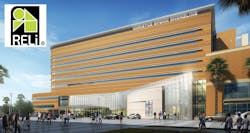USGBC Adopts RELi Standard
RELi, developed in conjunction with Perkins+Will and the Institute for Market Transformation to Sustainability (MTS), is a resilience consensus standard that was formally adopted by the U.S. Green Building Council (USGBC) as of Nov. 8, 2017.
Similar to but independent from LEED, RELi (pronounced “rely”) is a perspective “roadmap” that helps architects, city planners, developers, businesses, neighborhoods, and communities to better withstand natural disasters such as hurricanes, super storms, droughts, heat waves, earthquakes, and social volatility. By being formally adopted by USGBC, RELi will be recognized, managed, and utilized as a global rating system under the USGBC and the Green Business Certification, Inc. (GBCI). RELi was born five years ago through an American National Standards Institute (ANSI) initiative led by MTS, an ANSI-accredited standard developer, with content creation
led by Perkins+Will, Eaton Corporation, Deloitte Consulting,
and Impact Infrastructure providing additional expertise. On Dec. 1, 2014, RELi National Consensus Standard Version 1.0 was balloted and approved.
“We are delighted, if not humbled, that the USGBC is embracing this innovative tool that we and our partners have worked on so diligently and so passionately for the last half-decade,” said Doug Pierce, principal investigator for RELi and co-director of Perkins+Will’s Resilience Research Lab. “What we’re seeing now is the merging of thought leadership from some of the world’s most progressive designers and thinkers with the global organizing capacity of the USGBC. It's going to create unprecedented potential for market transformation towards resilience planning and resilient design.”
RELi takes building blocks from LEED, such as awarding points for various credits across multiple categories, and incorporates many of the guidelines’ prerequisites and credits for sustainability. However, RELi introduces a comprehensive series of new criteria that is focused on environmental, social, and economic considerations for resilience, such as Fundamental Access to First Aid, Emergency Supplies, Water, Food, and Communications. Other considerations include adaptive design for sea rise, storm surge, and extreme weather events and hazards, among others.
Janice Barnes, the global resilience director and co-director of the Resilience Research Lab at Perkins+Will, explained, “Our communities and our buildings are all interconnected … If your local economy is weakened by globalization, this could impact your financial stability, access to services, and health and well-being. The comprehensive nature of RELi is a response to this, allowing for hazard preparation and adaptation, as well as chronic risk mitigation.”
Currently, RELi is being used by pilot projects in Washington, D.C, Minnesota, Oklahoma, and Texas, including the Christus Spohn Hospital in Corpus Christi, which had success in withstanding Hurricane Harvey with little to no damage.
In addition to being a standard for designing buildings, neighborhoods, and communities, RELi also has economic benefits. With USGBC’s adoption comes a new “Resilience Steering Committee” chaired by Pierce and vice-chaired by Alex Wilson of the Resilient Design Institute. The Committee will work to continue to refine the RELi standard to maximize its usefulness in the marketplace.
